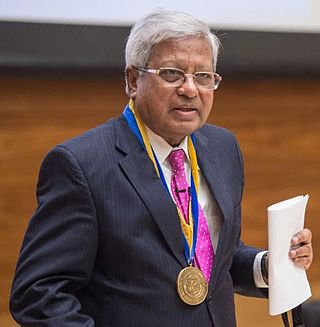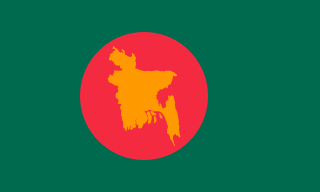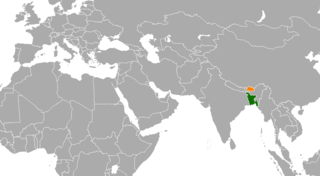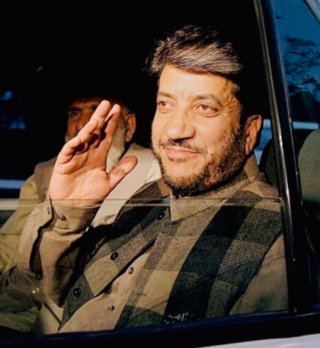
The least developed countries (LDCs) are developing countries listed by the United Nations that exhibit the lowest indicators of socioeconomic development. The concept of LDCs originated in the late 1960s and the first group of LDCs was listed by the UN in its resolution 2768 (XXVI) on 18 November 1971.

Tajuddin Ahmad was a Bangladeshi politician. He led the 1st Government of Bangladesh as its prime minister during the Bangladesh Liberation War in 1971,and is regarded as one of the most instrumental figures in the birth of Bangladesh.
Wakil Ahmad Muttawakil Abdul Ghaffar is an Afghan politician who has been a member of the militant Taliban organization. He was the Taliban foreign minister from 27 October 1999 in their first Islamic Emirate of Afghanistan rule,until the Taliban were deposed in late 2001. Prior to this,he served as spokesman and secretary to Mullah Mohammed Omar,leader of the Taliban. After the Northern Alliance,accompanied by U.S. and British forces,ousted the regime,Muttawakil surrendered in Kandahar to government troops.

Sir Fazle Hasan Abed was the founder of BRAC,one of the world's largest non-governmental organizations.

Mahmud Hasan Deobandi was an Indian Muslim scholar and an activist of the Indian independence movement,who co-founded the Jamia Millia Islamia University and launched the Silk Letter Movement for the freedom of India. He was the first student to study at the Darul Uloom Deoband seminary. His teachers included Muhammad Qasim Nanawtawi and Mahmud Deobandi,and he was authorized in Sufism by Imdadullah Muhajir Makki and Rashid Ahmad Gangohi.
United Bengal was a proposal to transform Bengal Province into an undivided,sovereign state at the time of the Partition of India in 1947. It sought to prevent the division of Bengal on religious grounds. The proposed state was to be called the Free State of Bengal. A confessionalist political system was mooted. The proposal was not put up for a vote. The British government proceeded to partition Bengal in accordance with the Mountbatten Plan and Radcliffe Line.

Syeda Rizwana Hasan is a Bangladeshi lawyer and environmentalist. She is currently an adviser to the interim government of Bangladesh and as Minister of Environment,Forest and Climate Change. As an environmentalist,her work is focused on regulations for the shipbreaking industry in Bangladesh,and was awarded the Goldman Environmental Prize in 2009. She was also awarded the Ramon Magsaysay Award in 2012 for her "uncompromising courage and impassioned leadership in a campaign of judicial activism in Bangladesh that affirms the people's right to a good environment as nothing less than their right to dignity and life."

The Provisional Government of Bangladesh,popularly known as the Mujibnagar Government;also known as the Bangladeshi government-in-exile,was the first and founding government of Bangladesh that was established following the proclamation of independence of East Pakistan as Bangladesh on 10 April 1971. Headed by prime minister Tajuddin Ahmad,it was the supreme leadership of the Bangladeshi liberation movement,comprising a cabinet,a diplomatic corps,an assembly,an armed force,and a radio service. It operated as a government-in-exile from Kolkata. The president of this government was Sheikh Mujibur Rahman who is the main undisputed figure here but in his absence Syed Nazrul Islam became the acting president.

Bangladesh–Bhutan relations are the bilateral relations between Bangladesh and Bhutan. The King of Bhutan was the first world leader to announce official recognition of Bangladesh's independence on 6 December 1971. The leadership of both countries have since exchanged many state visits. In 2016,the President of Bangladesh addressed the Parliament of Bhutan. On 6 December 2020,both countries signed a Preferential Trade Agreement (PTA) with provisions for free trade in certain goods. The signing of the PTA was witnessed by the Prime Minister of Bangladesh and the Prime Minister of Bhutan.

Shabir Ahmad Shah popularly known as Shabir Shah,in Kadipora,Anantnag,Kashmir is the founder and president of the Jammu and Kashmir Democratic Freedom Party (JKDFP),one of the main separatist political organizations seeking "right of self-determination" to Jammu and Kashmir.

Bangladesh and Israel do not have diplomatic relations. Bangladesh has stated that it will not recognize Israel until there is an independent Palestinian state. Some reports have alleged that Bangladesh and Israel maintain some trade relations indirectly and sometimes secretly and via proxies,although the Bangladesh government denies these allegations.
Khondokar Mahmud Hasan is a Bangladeshi diplomat and jurist who served as the 13th Chief Justice of Bangladesh.
Mir Ahmad Bin Quasem Arman,also known as Mir Ahmad,is a Bangladeshi born British-trained barrister and human rights activist. He was a victim of enforced disappearance and was believed to have been abducted by security forces of the government of Bangladesh. He is the son of late Mir Quasem Ali,a prominent leader of the Bangladesh Jamaat-e-Islami party,and was a member of his father's legal defence team before his abduction.

The Shah Jalal Dargah is the shrine and burial place of the 14th century Muslim saint Shah Jalal,located in Sylhet,Bangladesh. The site,known as a dargah,was originally constructed c. 1500,though many additions and alterations were made to its structures over the following centuries. It became a religious centre in the region,respected across multiple ruling administrations and greatly venerated among Bengalis,with local folklore and legends developing around it. The extensive surrounding compound serves several functions and includes four mosques,a religious school and a public cemetery among others. The Dargah is presently the largest and most visited religious site in Bangladesh.

Mahmudul Hasan is a Bangladeshi Islamic scholar,currently holding the position of Chairman of Al-Haiatul Ulya Lil-Jamiatil Qawmia Bangladesh,the government-recognized apex body for Qawmi madrasas,as well as Chairman of Befaqul Madarisil Arabia Bangladesh since 3 October 2020. He is often referred to as 'Mohius Sunnah' for his role in leading the Majlis-e Dawatul Haq Bangladesh,a movement linked to Ashraf Ali Thanwi's reform initiatives,and he is recognized as a Sufi master in the Thanwi order through his discipleship under Abrarul Haq Haqqi,a successor of Thanwi. He has been leading Jamia Islamia Darul Uloom Madania for over four decades and serves as the President of the National Fatwa Board,as well as the Khatib of Gulshan Central Masjid. He has authored a four-volume Quranic exegesis named Burhan al-Quran and written more than two hundred other books,in addition to establishing Al-Jamia,a monthly magazine published in Dhaka.
Mushrefa Mishu is a Bangladeshi trade unionist and politician. She is the current president of the Garment Workers Unity Forum and general secretary of Bangladesh's Democratic Revolutionary Party.
Duty Free Tariff Preference (DFTP) is a unilateral non-reciprocal preferential tariff scheme provided by the Government of India for the least developed countries (LDCs). The scheme was officially introduced on 13 August 2008. India was the first developing country to introduce a preferential tariff program for the LDCs.

Ziaur Rahman's tenure as the President of Bangladesh started with his acquisition of the presidency from Abu Sadat Mohammad Sayem on April 21,1977 after the latter resigned from his position on health grounds. Zia became the President of Bangladesh at a time when Bangladesh was suffering from a host of challenges that included low productivity,food shortage that resulted in a famine in 1974,unsatisfactory economic growth,severe corruption and a polarized and turbulent political atmosphere after the assassination of Sheikh Mujibur Rahman and his family members in a coup that was followed by a series of counter-coups in the military. He is credited as a solid administrator with pragmatic policies who contributed to the economic recovery of Bangladesh by liberalizing trade and promoting private sector investments.
Syed Sultan Uddin Ahmed is a Bangladeshi activist and chairman of the Labor Reform Commission of the Yunus ministry. He is the executive director of the Bangladesh Institute of Labour Studies. He is a workers rights specialist for the International Labour Organization. He was the coordinator of the Domestic Workers' Rights Network,affiliated with the International Domestic Workers Federation.












